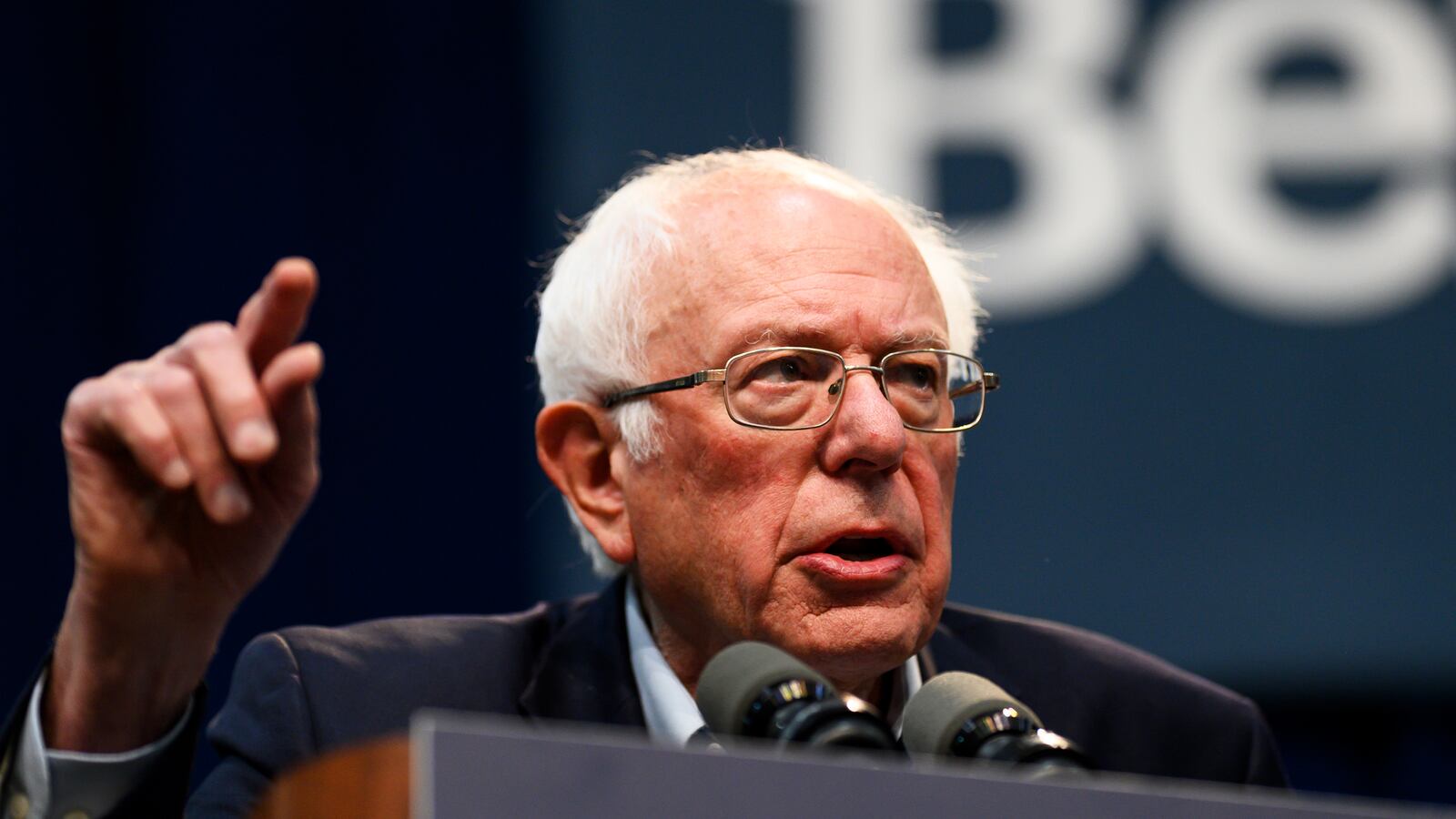Bernie Sanders, a top competitor in the Democratic primaries, has attacked Joe Biden for bringing “just a lot of baggage” into the race. But if past views are a major consideration, consider the baggage that Sanders drags into the campaign.
Go back over 40 years, to the start of Iran’s long conflict with the United States. On April 1, 1979, the theocratic Islamic Republic of Iran was proclaimed. Ayatollah Ruhollah Khomeini, who had returned to Iran from exile to assume command of the revolt, became Supreme Leader in December of that year. His rise was accelerated by the seizure on Nov. 4 of 52 American diplomats and citizens, and citizens of other countries, at the U.S. Embassy in Tehran. The hostage crisis became the means by which the Ayatollah crushed political opponents in Iran. Dealing with the hostage taking became the overwhelming political crisis for President Jimmy Carter. It lasted 444 days.
Virtually all Americans—Democrats, Republicans and independents—united in support of the hostages and the international call for their freedom. One prominent political figure on the 2020 stage, then almost completely unknown, stood apart by joining a Marxist-Leninist party that not only pledged support for the Iranian theocracy, but also justified the hostage taking by insisting the hostages were all likely CIA agents. Who was that person? It was Bernie Sanders.
Sanders would like the public to believe, as an AP story put it, that “democratic socialism [is] the economic philosophy that has guided his political career.” But that has not always been the case. In 1977, he left the tiny left-wing Liberty Union Party of Vermont that he’d co-founded, and in 1980 instead aligned himself with the Socialist Workers Party (SWP), the self-proclaimed Trotskyist revolutionary party, became its presidential elector in Vermont, and campaigned for its candidates and platform that defended the Iranian hostage seizure.
In fact, the SWP’s position on Iran is part of what distinguishes it from democratic socialist groups. When its presidential candidate, Andrew Pulley, came to speak at the University of Vermont in October 1980, Sanders chaired the meeting. Pulley attracted only 40 students to his rally, where he concentrated, according to the SWP’s newspaper The Militant, “on the Iran-Iraq war,” and condemned “anti-Iranian hysteria around the U.S. hostages.” Military action against Iran was not at that point theoretical—Pulley’s speech came six months after the attempt to free the hostages in Operation Eagle Claw had failed.
In his standard stump speech, Pulley condemned “Carter’s war drive against the Iranian people,” and said that the U.S. “was on the brink of war with Iran,” which would be fought “to protect the oil and banking interests of the Rockefellers and other billionaires.” Americans, he predicted, would soon “pay on the battlefields with our very own lives.” Their criticism of the Ayatollah was intended “to get us ready for war.” And, Pulley charged, the media who criticized those of us who were against “American imperialism” were “declared insane.” As for the hostages, Pulley said “we can be sure that many of them are simply spies… or people assigned to protect the spies.”
Pulley’s words were a direct echo of what the Islamic Society of University Teachers and Students had declared on Nov. 4, 1979 : “We defend the capture of this imperialist embassy, which is a center for espionage.”
Six months after the 1980 election, on May 21, 1981, Sanders spoke at another Pulley rally. “For the last 40 years,” Sanders said, “the Socialist Workers Party has… been harassed, informed upon, had their offices broken into, had members of their party fired from their jobs, and have been treated with cold contempt by the United States government.” Even worse, he went on, apparently referring to the Iranian hostage crisis, “now anybody who stands up and fights and says things is automatically a terrorist.” He claimed that he had been investigated himself by the FBI because “I was an elector for the Socialist Workers Party,” referring to his formal role in the 1980 election with the Trotskyists.
The Sanders campaign did not respond to a request for comment. Asked about the SWP in 1988, Sanders, then the mayor of Burlington and a congressional candidate, talked down the connection, saying that: “I was asked to put my name on the ballot and I did, that’s true." Today, no mention of Sanders’ association with the SWP appears in any campaign biography he has issued. But Sanders remained tied to the party after 1980. He was a featured speaker at a Boston rally for the SWP’s Massachusetts gubernatorial candidate and the party’s slate for Congress in 1982, the year after he was narrowly elected mayor of Burlington. In 1984, he again spoke on behalf of the SWP’s presidential candidate, this time former Black Panther Mel Mason, telling The Militant that “at a time when the Democratic and Republican parties are intellectually and spiritually bankrupt, it is imperative for radical voices to be heard which offer fundamental alternatives to capitalist ideology." It remains unclear when Sanders’s affiliation with the SWP ended.
Of course, Sanders had a right to his beliefs. But he has not been fully transparent about what those beliefs, connections, and loyalties have been over the years. Sanders says that he has been consistently and firmly dedicated to democratic socialism. His record, however, reveals a very different story around the time of the Iranian hostage crisis.
But Democratic voters today concerned above all with defeating Donald Trump and the electability of their prospective presidential candidate need to know the whole of Sanders’ history. He has not always been the democratic socialist he claims to be. Sanders could have supported the Socialist Party, the Democratic Socialist Organizing Committee, or Social-Democrats U.S.A., the three leading democratic socialist organizations existing in 1980. He rejected them. Instead he embraced a Marxist-Leninist communist sect that proclaimed its solidarity with Iran.
The preeminent democratic socialist of the time, Michael Harrington, wrote that the hostage taking was “terribly wrong,” and that “the original evil was compounded by the psychological and physical brutalization to which at least some of the hostages were subjected. The moral stance of those who denounce such acts is clear and compelling.”
Far from denouncing the acts, Sanders stood with those who applauded the hostage taking.
If Sanders were to become the Democratic presidential nominee, all this will come pouring out in Trump ads on television and social media. Voters will see TV clips of the American hostages, blindfolded and abused, alongside Sanders as the Trotskyist elector supporting the Iranian kidnappers. Rest assured, Trump will make absolutely sure that it is Sanders’ own past that will bury him and perhaps the Democratic Party.





